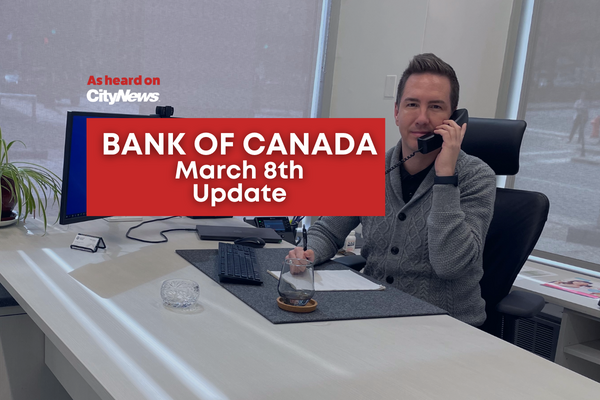Clinton joins Todd Veinotte for this special news update on a Toronto news announcement about a potential big drop in prices in the coming months. Clinton gives his take on what that means for Nova Scotians, and gives refinance advice.

Bank Of Canada – Options For Homeowners In Challenging Times
Clinton Wilkins catches up with CityNews host, Sam Laprade in Ottawa about the latest Bank of Canada announcement. They chat about the hold on interest rates and why it’s good news for Canadians on variable rates, transitioning from a variable to a fixed rate and the importance of asking for mortgage advice early on.
00:01
The Sam Laprade show continues on City News 1011 FM and 13:10am.
The Bank Of Canada holds interest rates
Sam Laprade 00:14
Okay, when you went to bed last night, if you’re a homeowner, you maybe crossed your fingers and thought, Oh, I hope that interest rate doesn’t go up. We heard from a lot of economists that they weren’t expecting a hike. But certainly because of the last year or so we’ve seen so many of those hikes come, one just never knows until the Bank of Canada actually makes that announcement. They did hold the line today at 4.5%. We wanted to understand what this means for homeowners and potential homeowners. So we call Clinton Wilkins. Hi, Clinton.
Clinton Wilkins 00:47
Hi Sam, how are you doing today?
Sam Laprade 00:48
Fantastic. Clinton is from Centum Home lenders ltd. We were kind of expecting this right Clinton? That Tiff Macklem was going to hold the line here.
Good news for borrowers with variable rate mortgages
Clinton Wilkins 00:58
You know what they even came out and said this, Sam, you know, where they basically said, we’re going to plateau type situation. And you know what, I think that is good news for Canadians. And it certainly is good news for any borrowers that are in a variable rate mortgage product, that have any consumer debt that’s connected to the key overnight rate, or the prime rate. It’s a lot easier when the rates are high to build a plan, you if you have some certainty that, okay, we’re in a holding position, you can make some decisions, make, you know, choices on what’s gonna be best for your household, etc. It’s tough when we’re, you know, in an increasing rate environment, maybe not so challenging when it’s decreasing, but when it’s increasing, certainly, there’s a lot of uncertainty. And you’re always waiting for that next announcement.
“Homeownership has been more challenging the last 12 months for many Canadians.”
Sam Laprade 01:40
Well I think about the eight consecutive hikes Clinton, I felt like I was on a bit of a emotional roller coaster with you during those because it was very difficult, you know, to come on here and say that the, you know, the interest rate had been increased by a by a whole, you know, 100 basis points. Those are, those are moments that you just know, people are in their car listening to the radio going, oh no, like, this is really gonna affect my house.
Clinton Wilkins 02:05
Yeah. And we’d like giving good news. You know, I think in the mortgage industry, you know, as a mortgage broker, you know, I really like making dreams happen every day. And homeownership is part of that Canadian dream. But homeownership certainly has been more challenging the last 12 months for many Canadians. And it’s not just the Canadians that are in a variable rate mortgage product, Sam, it’s the Canadians who have the mortgages that are coming up for renewal are certainly feeling the pinch. We’re talking to these consumers every single day. And it’s not just mortgage interest. As you know, housing costs in general is very high. And you know, inflation may have softened in many categories. But the inflation around you know, food and food costs, is still some of the highest out there. And you know, those are the two things that I think are impacting Canadians, at least every day. Is that housing costs and you know, the food costs for sure.
Transitioning to a variable rate
Sam Laprade 02:59
Do you have people Clinton that are maybe in a variable, and they phone you and say, Clinton, get me out of this? I’m looking for a you know, for just a stable, I know exactly what I’m paying, rate are they looking for, for something more stable?
Clinton Wilkins 03:14
I think some consumers certainly are looking at doing either a midterm refinanced, or midterm transfer, if they’re in a variable rate. I think it’s tough. You know, there’s some customers that are in a variable, and they’re at prime minus 100 basis points, or 110, or 120, or 130. Those customers that have very deep discounts below prime, in some cases, are willing to ride it out. Because, you know, at some point, the Bank of Canada will start softening the rates. Some economists think that we might see softening, even before the end of this year. You know, realistically, I think the rates are high all year, Sam, I think that’s just reality. But some consumers are losing sleep at night. And some consumers need to have a lower payment, just to be able to survive. And I think in those cases, there’s nothing wrong with either converting into a fixed rate, or doing a transaction. Typically, a lender will give a new customer a lower rate than if you convert with your existing lender. So for example, we’re doing a lot of transfers for customers and refinances into a three, four or five year fixed, because we’re able to leverage, you know, one lender against another. And the cost exit that variable rate mortgage is only three months interest. So the cost typically is very low. And the new lender, in many cases will either capitalize or pay most or all of the penalty from the new mortgage proceeds. So the consumer may not even need to pay any money out of pocket to be able to do that transfer and really kind of leverage at the best rate. And I think, you know, the popularity of shorter term fixed rates, I think it’s certainly out there. I’ve been doing this for 17 years, and I’ve done over 5000 transactions, but I’ve never had so many customers asked me for shorter terms like three years fixed.
Longer amortizations are more popular
Sam Laprade 04:57
Interesting. Can we talk about it amortization Clinton because I think when you’re, you know, you pull up those mortgage calculators and you just sort of throw in, you know how much the house is. And then, you know, it’s kind of tempting to go, Oh, should we just kind of, you know, suck it up for 10 or 15 years and have really big payments, and then it’s all paid off. Or some people have the analogy live that let’s live in this house, and not be house broke, and take it over 25 or even 30 years. Walk me through the process, from your perspective on amortization.
Clinton Wilkins 05:30
I think longer amortization certainly are more popular today, Sam. And we certainly have customers that were in shorter amortizations, when they’re doing these transactions, whether it’s at renewal, or in midterm, and they’re choosing to do a longer amortization, just for the sheer fact that the rates are high right now. And they’re saying, hey, Clinton, we’re gonna take a 25 or 30 year amortization, for now, we know this is not a forever plan for us, because we do want to hammer our debt down, but they’re doing it for the short term. And that’s really to alleviate some of the other issues around inflation, not just the mortgage borrowing cost, but to help maybe with that food cost, because it’s lowering what their payments are. So I would agree longer amortization certainly are more popular, I can tell you my personal situation, I’m in a variable rate mortgage. So for any of our listeners out there, you know, I’m a professional, and I do this every day, my personal mortgage was down to about a 16 year amortization. But now, with obviously, the increases in the rates, my amortization now is almost 40 years.
“If you’re in a variable, and you’re having some challenges, talk to your lender about what some of the possible options will be.”
Clinton Wilkins 06:28
It’s interesting, the federal government has come out that they are going to allow banks to extend amortizations basically, indefinitely right now, due to what’s going on with the higher borrowing costs. So, you know, if you’re in a variable, and you’re having some challenges, or if you had a trigger rate, you know, I would say talk to your lender, or talk to your unbiased mortgage professional, talk about what some of the possible options will be. Many consumers do have some equity in their home. And many consumers have lenders that will work with them to you know, maybe restructure that mortgage to make it you know, more palatable even in the short term.
Sam Laprade 07:03
We only have about a minute Clinton, but I really feel like I, I want you we’ve talked about this before, but I want you to reiterate how important it is to reach out to somebody as opposed to having sleepless nights to be honest and open with with someone like yourself, Clinton, talk to me a little bit about that.
“The earlier we can get to a problem, the better the solution will be.”
Clinton Wilkins 07:23
You know, I think finances are, you know, sometimes a little bit of a taboo topic, Sam. You know, I think reaching out for advice, and sometimes the advice is do nothing, and that is okay. But sometimes the advice is, there is something that you can do, and it will better your financial position. And I think sometimes people just hide, and they don’t want to talk about, you know, their challenges. But I think that sometimes can be a snowball effect, and the situation can just get worse and then maybe the solution becomes more challenging or more costly. So, you know, ask for help and ask the questions early on. I always say, you know, the earlier we can get to you know, a problem, the better the solution will be.
Sam Laprade 08:01
Brilliant. I always I always love our date. We always have a date on the Bank of Canada annoucnement.
Clinton Wilkins 08:06
I know, we’ll have another date here in early June. I think June 7 is the next Bank Of Canada announcement. So we’ll be back on here with you at that time, Sam.
Sam Laprade 08:14
Look forward to it. Clinton Wilkins, spending time with us. Centum Home Lenders ltd. We appreciate his expertise always. When we come back, we’re going to meet Eva Burnett. She is an Ottawa police 911 dispatcher we’re going to learn about her work. Because it is fascinating. I’m fascinated with 911 dispatchers, and the kind of of job that they do every single day. It is not an easy job. We’re going to find out about Eva’s job when we come back. Stay with us here on City News.
08:44
Sam Laprade, we’ll be right back on City News 1011 FM and 13:10am


